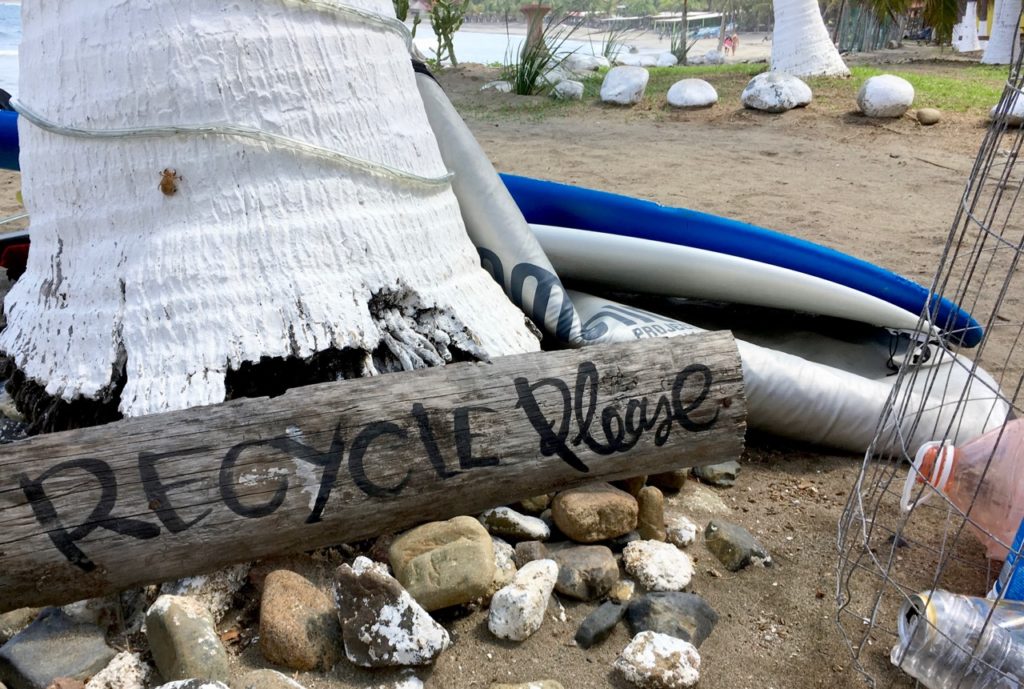I have a vivid memory of a young boy throwing trash out the window of a bus in Mexico. Piece by piece, his mother handed him a plastic shopping bag, a food wrapper, a Styrofoam plate, a fork, a plastic water bottle. Each item twirled briefly in the air before settling on the side of the road, amidst piles of colorful and stinking detritus. The little boy squealed with delight. His mother clapped her hands. I sat silently next to them, angry and resentful, feeling powerless to do anything about it.
What could I do? Lecture them on the evils of littering? Convince them to dispose of their trash in a garbage can? If so, what garbage can?

The problem for many regions in Mexico is not just lack of garbage cans, but lack of a system for emptying them when they become full. Few cities have municipal trash collection, even fewer have recycling programs. Mexico is the number one consumer of single-use plastics in the world, but only 15% of these items are recycled. Most of them are burned, releasing toxins into the air; or left to accumulate on the side of the road, eventually travelling downriver into the ocean.
In 2008, Erwing Rodriquez Ibarra, Laine Johnstone Giovale, Mike Giovale, and Pato Leon formed the Azulita Project, a grassroots recycling program in Los Llanos, near the popular surf break, Playa Saladita. Erwing and his wife donated property for a recycling plant, and the Giovale family raised funds for buildings and supplies.
To start, Erwing recruited 15 local youth, committing to paying their soccer team fees. In return, they each had to sign a contract promising to engage in conscientious activities such as recycling, beach cleanup, and volunteer work; as well as keep up with school and show good sportsmanship at soccer games.
During the first beach cleanup at Playa Saladita, volunteers removed 3 tons of plastic waste from the shore and riverbanks. Since then, the Azulita Project has obtained a plastic compactor, hired 6 full-time employees, obtained certification as a 501c3 non-profit, and expanded its program to service a range of pueblos in the municipality of La Union.
The Azulita Project buys plastic from locals for 5 pesos per kilogram, giving them incentive to recycle, rather than discard or burn their plastic waste. Erwing offers an advance of 500-1000 pesos to locals looking for work, encouraging them to make money collecting plastic trash. The Azulita Project resells the plastic in bulk to processors, establishing an infrastructure for recycling in a region that would otherwise have none.
Bionic Yarn, an eco-manufacturer in the United States, just signed a contract with the Azulita Project to purchase the plastic it collects. Soon, the same plastic that would have polluted the ocean will be made into board shorts and other eco-friendly products.

Plastic bottles can be made into a variety of eco-goods, like this backpack made from 100% recycled plastic.
On June 19, 2017, I accompanied Erwing, Angel, Yosimar, Aureliano, and Salbador to a presentation in the community of Porto Ixtapa. The management in this upscale community recently implemented a recycling program, and I listened to Erwing give a speech to the housekeeping staff explaining why. The Azulita Project team presented a range of educational materials, including posters, video, and art, as the crowd of 20 or so staff members listened intently, nodding their heads. A few raised their hands to ask questions, or comment about the plastic pollution in their pueblos. Next, Erwing invited me to say a few words, which I’d prepared and read aloud in Spanish. Click here to read my speech.
As a surfer, I cherish a clean beach and a healthy ocean. Surprisingly, the Azulita Project receives very little support from the surfing community. It’s almost entirely funded by the Giovale family and the generous efforts of Erwing and his team. I’m grateful to the Azulita Project for giving me the opportunity to voice what I couldn’t say on the bus, and to work toward a solution for plastic pollution. That’s why I’m personally donating money to the cause and working to spread the word about this organization.

Part of the Azulita Project team: Salbador, Josemar, and Aureliano.
You Can Help
- Click here to donate to the Azulita Project.
- Share this story using the buttons below!

Such a righteous cause, great work to all who make the Azulita Project realize the future of clean & healthy beaches!
The Azulita Project is a reflection of you: you surf and live your life neatly and tidily, with smooth movements and grace . . . clean. You weed out of your life things that don’t belong there. I will keep my eye on the project and watch it grow and grow.
way to go Aloe!